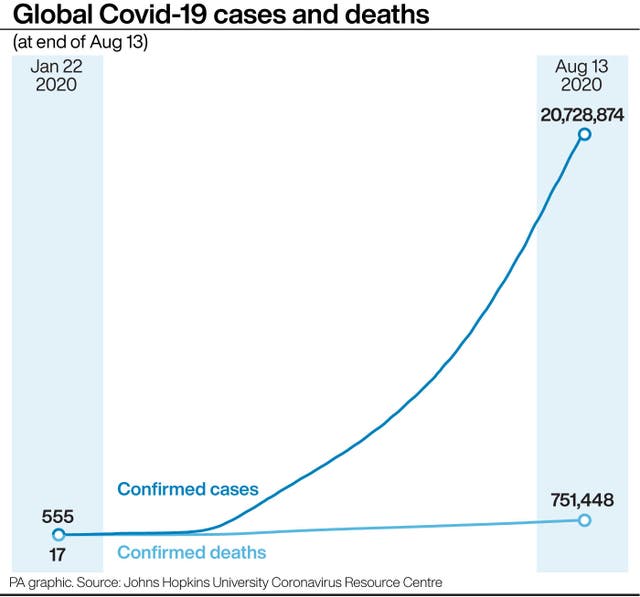
The Government has reached agreements it says will give British citizens early access to 90 million doses of two more potential Covid-19 vaccines.
The vaccines are being developed by US biotech company Novavax and pharmaceutical business Janssen, which is headquartered in Belgium and owned by Johnson & Johnson.
Under the in-principle agreements, the UK has secured 60 million doses of the Novavax vaccine, with it supporting a Phase 3 clinical trial with the National Institute for Health Research (NIHR).
READ MORE: Coronavirus: Oxford vaccine 'appears safe' and can train immune system
Some 30 million doses have been secured from Janssen and ministers have agreed in principle to co-fund a global clinical study of its vaccine.
 (PA Graphics)
(PA Graphics)
The new agreements, on top of earlier deals, mean the UK now has access to six different Covid-19 vaccine candidates in development, across four different types, representing some 340 million doses.
Despite the scale of the Government’s potential stockpile, Kate Bingham, chair of the Government’s Vaccines Taskforce, warned that it was still not known if any of the vaccines would be effective.
Speaking to ITV’s Good Morning Britain on Friday, she said: “The issue is we don’t know which if any of these vaccines may work, because there have been no vaccines against any human coronavirus.
“So what we’re doing is we’ve chosen six of the most promising vaccines across four different vaccine types and we’re hoping that one of those will work.
“It would be a nice position if they all work, but that’s not likely. The reality is that most will fail and we want to be sure that if any one is shown to be effective and safe that we have rights to it.”
Ms Bingham said she was “reasonably confident” of a vaccine being found that will reduce the severity of coronavirus symptoms and reduce deaths.
The Government’s latest agreement follows on from 90 million doses in the pipeline under deals with an alliance between the pharmaceutical giants BioNtech and Pfizer, as well as the firm Valneva.
 Alok Sharma (Aaron Chown/PA)
Alok Sharma (Aaron Chown/PA)
Some 100 million doses of vaccine could come from a vaccine being developed by Oxford University in partnership with AstraZeneca, while a deal has been struck for 60 million doses of GlaxoSmithKline (GSK) and Sanofi Pasteur’s potential Covid-19 vaccine.
READ MORE: Coronavirus: How does the Oxford Covid-19 vaccine work?
The deals cover four different classes: adenoviral vaccines, mRNA vaccines, inactivated whole virus vaccines and protein adjuvant vaccines.
Business Secretary Alok Sharma said: “The Government’s strategy to build a portfolio of promising vaccine candidates will ensure we have the best chance possible of finding one that works.
“Today’s agreements will not only benefit people in the UK but will ensure fair and equitable access of a vaccine around the world, potentially protecting hundreds of millions of lives.
“While we are doing everything we can to ensure the British people get access to a successful vaccine as soon as possible, nobody is safe until we are all safe, so global cooperation is absolutely critical if we are to defeat this virus once and for all.”
The Janssen vaccine, which is being made available on a not-for-profit basis, is expected to begin the next phase of clinical trials later this year and will look at whether two doses can provide long-term protection from coronavirus.
Meanwhile, Novavax plans to make some of its vaccine at Fujifilm Diosynth Biotechnologies’s facilities in Billingham, Stockton-on-Tees in the north-east of England one it is available.
The Government said that if the Novavax and Janssen vaccines are proven safe and successful in clinical trials they could be delivered to the UK in mid-2021.
The vaccines would first be given to priority groups such as front-line health workers, those with serious diseases, the elderly and ethnic minorities.


Why are you making commenting on The Herald only available to subscribers?
It should have been a safe space for informed debate, somewhere for readers to discuss issues around the biggest stories of the day, but all too often the below the line comments on most websites have become bogged down by off-topic discussions and abuse.
heraldscotland.com is tackling this problem by allowing only subscribers to comment.
We are doing this to improve the experience for our loyal readers and we believe it will reduce the ability of trolls and troublemakers, who occasionally find their way onto our site, to abuse our journalists and readers. We also hope it will help the comments section fulfil its promise as a part of Scotland's conversation with itself.
We are lucky at The Herald. We are read by an informed, educated readership who can add their knowledge and insights to our stories.
That is invaluable.
We are making the subscriber-only change to support our valued readers, who tell us they don't want the site cluttered up with irrelevant comments, untruths and abuse.
In the past, the journalist’s job was to collect and distribute information to the audience. Technology means that readers can shape a discussion. We look forward to hearing from you on heraldscotland.com
Comments & Moderation
Readers’ comments: You are personally liable for the content of any comments you upload to this website, so please act responsibly. We do not pre-moderate or monitor readers’ comments appearing on our websites, but we do post-moderate in response to complaints we receive or otherwise when a potential problem comes to our attention. You can make a complaint by using the ‘report this post’ link . We may then apply our discretion under the user terms to amend or delete comments.
Post moderation is undertaken full-time 9am-6pm on weekdays, and on a part-time basis outwith those hours.
Read the rules here